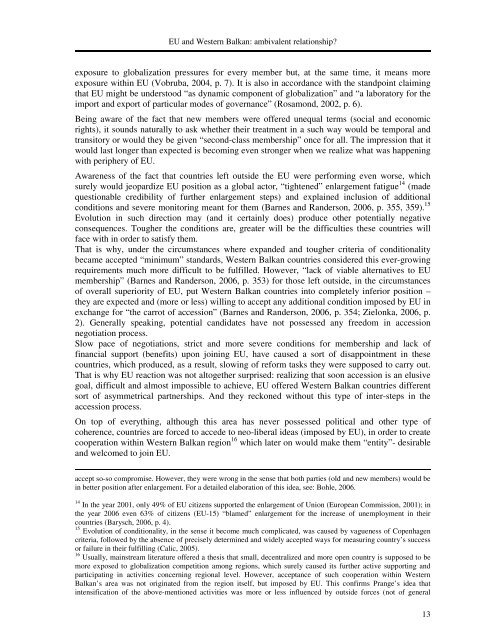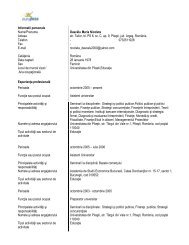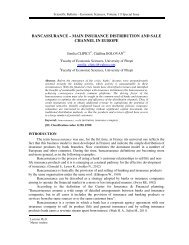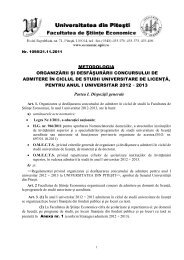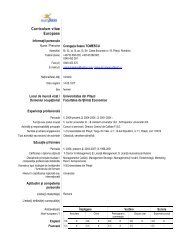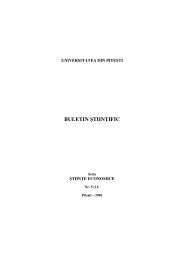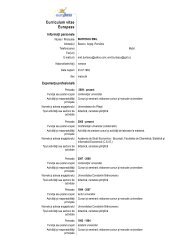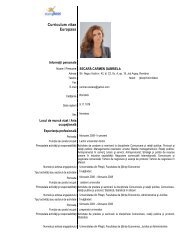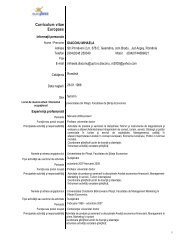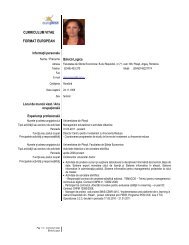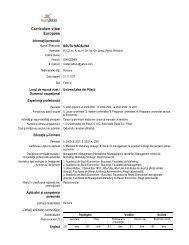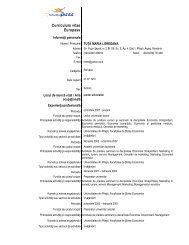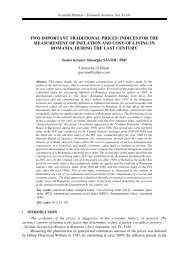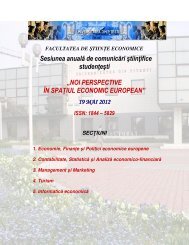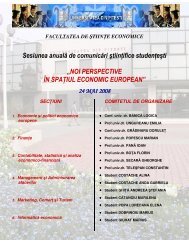buletin Åtiin ific - Facultatea de Stiinte Economice - Universitatea din ...
buletin Åtiin ific - Facultatea de Stiinte Economice - Universitatea din ...
buletin Åtiin ific - Facultatea de Stiinte Economice - Universitatea din ...
- No tags were found...
You also want an ePaper? Increase the reach of your titles
YUMPU automatically turns print PDFs into web optimized ePapers that Google loves.
EU and Western Balkan: ambivalent relationship?exposure to globalization pressures for every member but, at the same time, it means moreexposure within EU (Vobruba, 2004, p. 7). It is also in accordance with the standpoint claimingthat EU might be un<strong>de</strong>rstood “as dynamic component of globalization” and “a laboratory for theimport and export of particular mo<strong>de</strong>s of governance” (Rosamond, 2002, p. 6).Being aware of the fact that new members were offered unequal terms (social and economicrights), it sounds naturally to ask whether their treatment in a such way would be temporal andtransitory or would they be given “second-class membership” once for all. The impression that itwould last longer than expected is becoming even stronger when we realize what was happeningwith periphery of EU.Awareness of the fact that countries left outsi<strong>de</strong> the EU were performing even worse, whichsurely would jeopardize EU position as a global actor, “tightened” enlargement fatigue 14 (ma<strong>de</strong>questionable credibility of further enlargement steps) and explained inclusion of additionalconditions and severe monitoring meant for them (Barnes and Ran<strong>de</strong>rson, 2006, p. 355, 359). 15Evolution in such direction may (and it certainly does) produce other potentially negativeconsequences. Tougher the conditions are, greater will be the difficulties these countries willface with in or<strong>de</strong>r to satisfy them.That is why, un<strong>de</strong>r the circumstances where expan<strong>de</strong>d and tougher criteria of conditionalitybecame accepted “minimum” standards, Western Balkan countries consi<strong>de</strong>red this ever-growingrequirements much more difficult to be fulfilled. However, “lack of viable alternatives to EUmembership” (Barnes and Ran<strong>de</strong>rson, 2006, p. 353) for those left outsi<strong>de</strong>, in the circumstancesof overall superiority of EU, put Western Balkan countries into completely inferior position –they are expected and (more or less) willing to accept any additional condition imposed by EU inexchange for “the carrot of accession” (Barnes and Ran<strong>de</strong>rson, 2006, p. 354; Zielonka, 2006, p.2). Generally speaking, potential candidates have not possessed any freedom in accessionnegotiation process.Slow pace of negotiations, strict and more severe conditions for membership and lack offinancial support (benefits) upon joining EU, have caused a sort of disappointment in thesecountries, which produced, as a result, slowing of reform tasks they were supposed to carry out.That is why EU reaction was not altogether surprised: realizing that soon accession is an elusivegoal, difficult and almost impossible to achieve, EU offered Western Balkan countries differentsort of asymmetrical partnerships. And they reckoned without this type of inter-steps in theaccession process.On top of everything, although this area has never possessed political and other type ofcoherence, countries are forced to acce<strong>de</strong> to neo-liberal i<strong>de</strong>as (imposed by EU), in or<strong>de</strong>r to createcooperation within Western Balkan region 16 which later on would make them “entity”- <strong>de</strong>sirableand welcomed to join EU.accept so-so compromise. However, they were wrong in the sense that both parties (old and new members) would bein better position after enlargement. For a <strong>de</strong>tailed elaboration of this i<strong>de</strong>a, see: Bohle, 2006.14 In the year 2001, only 49% of EU citizens supported the enlargement of Union (European Commission, 2001); inthe year 2006 even 63% of citizens (EU-15) “blamed” enlargement for the increase of unemployment in theircountries (Barysch, 2006, p. 4).15Evolution of conditionality, in the sense it become much complicated, was caused by vagueness of Copenhagencriteria, followed by the absence of precisely <strong>de</strong>termined and wi<strong>de</strong>ly accepted ways for measuring country’s successor failure in their fulfilling (Calic, 2005).16 Usually, mainstream literature offered a thesis that small, <strong>de</strong>centralized and more open country is supposed to bemore exposed to globalization competition among regions, which surely caused its further active supporting andparticipating in activities concerning regional level. However, acceptance of such cooperation within WesternBalkan’s area was not originated from the region itself, but imposed by EU. This confirms Prange’s i<strong>de</strong>a thatintens<strong>ific</strong>ation of the above-mentioned activities was more or less influenced by outsi<strong>de</strong> forces (not of general13


